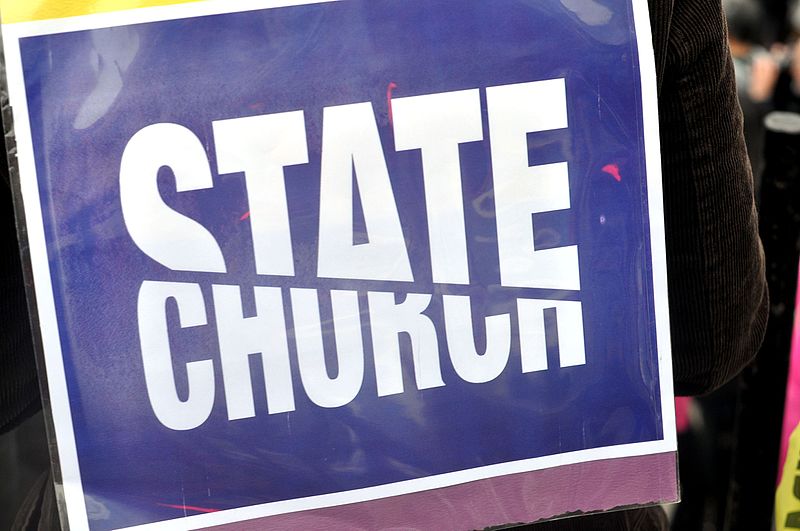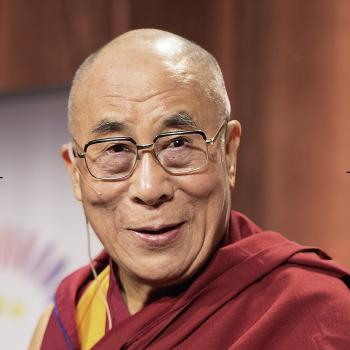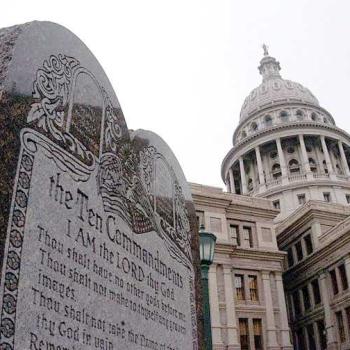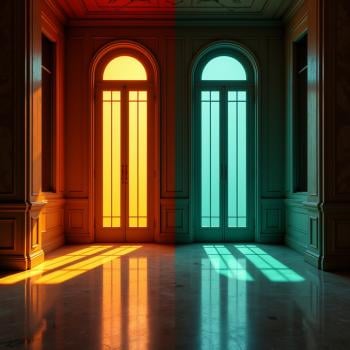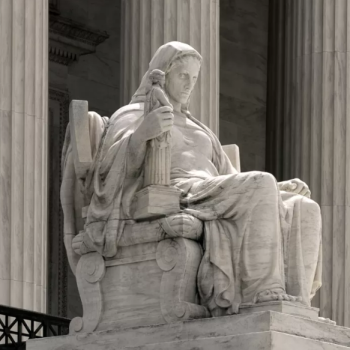Will there be Christian public schools in the U.S.? Recently Heidi Przybyla reported for Politico that “Groups aligned with the conservative legal movement and its financial architect, Leonard Leo, are working to promote a publicly funded Christian school in Oklahoma, hoping to create a test case to change the Supreme Court’s interpretation of the First Amendment’s separation of church and state.” Leonard Leo is a controversial figure who has been much in the news this past year for the way he has used money and connections to “rewire” the U.S. judicial system and push it to the Right. Leo has been accused, among other things, of trying to “capture” the U.S. Supreme Court on behalf of Christian Nationalism.
Leo is at the center of a billion-dollar network of nonprofits working to secure the opening of the first public Christian school in the U.S. This would be St. Isidore of Seville Catholic Virtual School, an online charter school already approved by an Oklahoma state agency called the Oklahoma Statewide Virtual Charter School Board. The school is expected to open in August of 2024 for the 2024-2025 school year. Leo and his allies obviously are hoping to overturn nearly a century of U.S. Supreme Court decisions saying that tax money may not be used to pay for sectarian religious instruction. Such use of tax money is considered a violation of the Establishment Clause of the First Amendment to the U.S. Constitution.
In the U.S., charter schools are public primary or secondary schools that are organized and operated independently from the standard public school system. They are chartered by the state or local government and subsidized by taxes. They are accountable to the state for meeting academic goals, but they have some autonomy to make their own rules and curricula. But up until now, charter schools in the U.S. have been strictly secular.
Christian Public Schools: The Opponents
St. Isidore’s opening is being challenged by a number of lawsuits, including a suit by the Attorney General of Oklahoma, Gentner Drummond. Drummond, a Republican, has warned the school board that St. Isidore not only violates the Establishment Clause of the U.S. Constitution, it also violates the Oklahoma Constitution. The Oklahoma Constitution says that public schools shall be “free from sectarian control,” and that no public money can be used to support any “sect, church, denomination, or system of religion, or sectarian institution.” The Oklahoma Charter Schools Act provides that charter schools “shall be nonsectarian in its programs, admission policies, employment practices, and all other operations.” Plus there are other Oklahoma laws that forbid state tax money from funding sectarian religious activity.
The American Civil Liberties Union, Americans United for Separation of Church and State, the Education Law Center, and the Freedom From Religion Foundation have also filed a joint lawsuit to stop St. Isidore of Seville from going online, or at least from being sponsored by the taxpayers of Oklahoma. In a joint statement, these organizations said, “The plaintiffs are faith leaders, public school parents, and public education advocates who object to their tax dollars funding a public charter school that will discriminate against students and families based on their religion and LGBTQ+ status, fail to adequately serve students with disabilities, and indoctrinate students into one religion.”
Christian Public Schools: The Advocates
The Oklahoma Statewide Virtual Charter School Board is represented in this dispute by the Alliance Defending Freedom, which identifies itself as a Christian advocacy legal organization. ADF works to expand Christian influence in education and government, outlaw abortion, and curtail LGBTQ rights. Among their other successes, ADF was behind the legal challenge that ended Roe v. Wade. It is a massively well-funded and well-connected organization. Heidi Przybyla writes that ADF “is significantly funded by donor-advised funds that allow their patrons to keep their identities secret but which receive large amounts of money from Leo-aligned groups.” Among these groups is Donors Trust, the “dark money ATM” of the conservative movement. Donors Trust has been the largest single beneficiary of Leonard Leo’s dark money group, the Judicial Education Project, Pszybyla writes. ADF is also identified as a hate group by the Southern Poverty Law Center.
St. Isidore is represented by Nicole Stelle Garnett of the Notre Dame Religious Liberty Initiative, a clinic associated with Notre Dame University in South Bend, Indiana. Garnett, a law professor at Notre Dame, is on the board of the Federalist Society, where Leonard Leo is co-chairman. She is also on the advisory council of a Catholic University law school initiative that is funded by anonymous donations directed by Leonard Leo. Supreme Court Justice Samuel Alito is the honorary chairman of that group. Lots of connections there.
Notre Dame also arranged for legal representation for St. Isidore from a private firm, Dechert LLP. The legal team there includes Michael McGinley, who assisted the Trump Administration in choosing convervative judicial nominees and who clerked for Supreme Court Justice Neil Gorsuch. McGinley is working pro bono for St. Isidore, according to Heidi Pszybyla at Politico.
A Century of Precedent
The first U.S. Supreme Court case to consider the issue of tax dollars going to religious schools was Cochran v. Louisiana State Board of Education (1930). In this case the Court decided that it was all right for the state of Lousiana to provide textbooks to parochial school students, since the books were a benefit to the students and not the school. The textbooks in this case were the same secular textbooks used in public schools in the state, so Louisiana was not taking part in promoting sectarian religious beliefs.
The first landmark case that officially declared states were bound by the Establishment Clause was Everson v. Board of Education (1947). In this case a New Jersey taxpayer objected to tax money being used to help pay for buses for parochial school students. In the majority decision, Justice Hugo Black quoted Thomas Jefferson’s famous metaphor for the Establishment Clause, a “wall of separation between church and state.” Black wrote, “The First Amendment has erected a wall between church and state. That wall must be kept high and impregnable. We could not approve the slightest breach.” However, “New Jersey has not breached it here.” The majority said that transportation to and from schools was a benefit to the students and their parents, not to a church, so the state could continue to help pay for buses to parochial schools.
Until recently, the Court was guided by what came to be called the “Lemon Test.” Laws and policies must have a clear secular purpose and must neither advance nor inhibit religion. In general over the years the Court has been lenient with laws that provide benefits to parochial school students, or which provide benefits to religious schools that don’t directly involve religious instruction. The line was drawn at tax dollars being used to promote or teach sectarian religious doctrines. That was considered a violation of the Establishment Clause and unconstitutional. At the same time, of course, churches and religious organizations are exempt from paying taxes.
A Crack in the Wall of Separation
In 2022 the current Supreme Court made a big change to the old ruless in a challenge to a Maine law. in rural Maine the population is too sparse to support public secondary schools. But the state is still obligated to provide free education through high school. So in some rural areas the state paid tuition for students to go to private schools, but only if the schools were nonsectarian. In Carson v. Makin, 2022, the Supreme Court said that if Maine was subsidizing tuition to private schools, it must not discriminate between religious and not-religious private schools. This opened the door to direct taxpayer funding of religious instruction. The current Court may very well rule in favor of opening public religious schools.
There is no question that St. Isidore would be providing religious instruction. The archdiocese said it intended to operate St. Isidore as a private Catholic school, and “as a genuine instrument of the Church.” It plans to teach that “Human persons are destined for life with the Holy Trinity … but that in freedom, an individual may reject God’s invitation and … end up in Hell,” according to its application.
The argument for funding of religious instruction is often framed as “religious liberty” and the right to free exercise of religion. But there is no other right I can think of that requires a government subsidy. I have a right to speak freely, but I don’t have a right to government-subsidized publication of my ideas. The government has never stood in the way of religious schools in the U.S. Any organization, religious or otherwise, may open a school and teach as it likes. Religious schools are already considered nonprofits and are exempt from most taxes. I don’t see how they are being oppressed.
Beware the Unintended Consequences
Those who have been trying to tear down the wall of separation to allow more benefits and privileges to Christianity don’t seem to grasp that such benefits and privileges would be claimed by other religions as well. Recently Peter Green, writing in Forbes, said, “Supporters seem to imagine that this will only ever mean taxpayer funding for Christian religious schools, but the inevitable result would be a wide variety of religions lining up for a chance at government funding for their religious school. Who will decide which religions are ‘legitimate’ and deserving of taxpayer funding?”
Green pointed to a recent incidente in which the Iowa state capital building was opened to religious displays from any religious group. So the Satanic Temple of Iowa — which is a tax-exempt religious organization as far as the IRS is concerned — submitted a display. This upset one lawmaker so much he tore the display down. This same fellow wants to pass laws to decide which religions are legitimate and which are not, which is something government has carefully avoided over the years. Who is going to decide? There are Christians who would eliminate Mormons, and Protestants who would eliminate Catholics. A lot of people would probably try to deny funds for Muslim, or Hindu, or Buddhist schools. What about Scientology, or Christian Identity/Ku Klux Klan? Or some sect that just got started down the road? This would be Pandora’s Box on steroids.
My suspicion is that Leonard Leo and his allies already have been working on legal arguments as to why the privilege of tax subsidy should only be given to Christian schools, and maybe Jewish ones, but no one else. There is language in the Carson decision about ‘history and tradition’ that might be elaborated upon to provide that argument. Let’s hope it doesn’t come to that.
